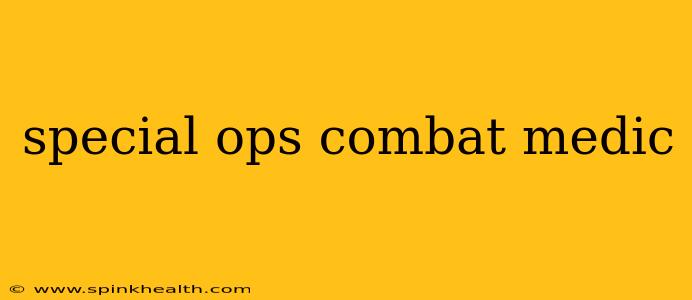The adrenaline rush. The life-or-death decisions. The unwavering commitment to saving lives under the most extreme conditions. This is the reality of a Special Ops Combat Medic. It's a career path far removed from the sterile environment of a hospital, demanding a unique blend of medical expertise, tactical prowess, and unwavering mental fortitude. It's a calling, not a job.
This isn't just about patching up a soldier on a battlefield; it’s about operating within the chaos of intense combat, often under fire, to provide immediate and decisive medical care. It’s about thinking on your feet, adapting to rapidly changing circumstances, and making split-second decisions that can mean the difference between life and death.
What Does a Special Ops Combat Medic Do?
A Special Ops Combat Medic’s responsibilities go far beyond those of a traditional medic. They are fully integrated members of their elite units, participating in all aspects of operations, from reconnaissance and infiltration to close-quarters combat. Their medical skills are just one part of their multifaceted skill set. Imagine this: you're part of a nighttime raid behind enemy lines, navigating treacherous terrain, and suddenly, your teammate is wounded. The Special Ops Combat Medic is the one who springs into action, providing advanced trauma care under immense pressure.
This demands proficiency in:
- Advanced Trauma Life Support (ATLS): Handling severe injuries like gunshot wounds, blast injuries, and penetrating trauma is routine.
- Combat Casualty Care: Understanding the unique challenges of providing care in a combat environment, including limited resources and the constant threat of enemy action.
- Tactical Combat Casualty Care (TCCC): This specialized training emphasizes immediate life-saving interventions on the battlefield.
- Emergency Medicine: Dealing with a wide range of medical emergencies, from fractures and burns to hypothermia and altitude sickness.
- Specialized Skills: Depending on the unit, this might include advanced airway management, surgical techniques (in some cases), or the ability to perform complex procedures in austere environments.
What Kind of Training Do Special Ops Combat Medics Receive?
The path to becoming a Special Ops Combat Medic is incredibly demanding. It begins with rigorous basic training, followed by specialized medical school and advanced training programs specific to the branch of service (Army Special Forces, Navy SEALs, Air Force Pararescue, etc.).
This intense training involves:
- Extensive medical schooling: Mastering advanced medical techniques and procedures.
- Tactical training: Becoming proficient in weapons handling, land navigation, and close-quarters combat.
- Survival training: Developing skills necessary to operate in harsh and unpredictable environments.
- Physical fitness: Maintaining peak physical condition, essential for enduring the physical demands of special operations.
What are the Requirements to Become a Special Ops Combat Medic?
The requirements are exceptionally high and vary slightly depending on the specific branch and unit. Generally, expect:
- Exceptional physical fitness: Passing grueling physical fitness tests is paramount.
- High academic achievement: A strong academic record is needed for medical school.
- Medical aptitude: Demonstrating aptitude for medicine and a dedication to patient care.
- Security clearance: Obtaining and maintaining a top-secret security clearance is often required.
- Strong mental resilience: The psychological demands of this role are immense; mental fortitude is key.
How Dangerous Is Being a Special Ops Combat Medic?
Undoubtedly, being a Special Ops Combat Medic is one of the most dangerous jobs in the military. They are often the first to respond to casualties, placing themselves directly in harm's way. They face the constant threat of enemy fire, explosions, and other hazards inherent to combat. The emotional toll is also significant, witnessing trauma and loss firsthand.
What are the Career Opportunities After Serving as a Special Ops Combat Medic?
The skills and experience gained as a Special Ops Combat Medic are highly transferable to various civilian careers. Many transition into:
- Emergency Medical Services (EMS): Paramedics, EMTs, flight paramedics
- Law Enforcement: Tactical medics, SWAT medics
- Private Sector Security: Providing medical support in high-risk environments
- Healthcare: Hospital settings, clinics, or specialized medical fields
The life of a Special Ops Combat Medic is one of immense responsibility, unwavering dedication, and profound courage. It's a career for those who seek the ultimate challenge and are willing to put their lives on the line to save others. It's a testament to the human spirit's capacity for resilience and unwavering commitment in the face of unimaginable adversity.

